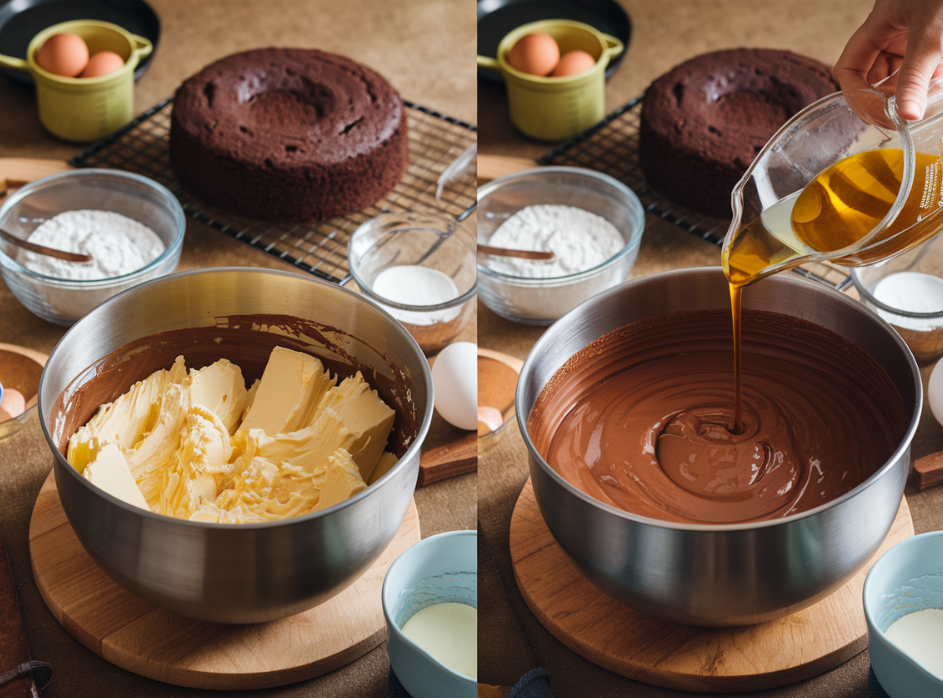When it comes to baking the perfect chocolate cake, choosing between oil and butter is a crucial decision that can dramatically affect the cake’s texture, flavor, and overall outcome. Both ingredients have their strengths, and understanding their roles will help you decide which one to use for your next cake. In this guide, we’ll explore the benefits of each, provide scientific insights, and help you make an informed choice.
The Role of Fat in Baking Chocolate Cake
Why Fat Matters
Fats are essential in baking as they:
- Add Moisture: Fat traps liquid, ensuring the cake stays moist.
- Create Texture: The type of fat impacts the cake’s crumb, making it either light and airy or dense and rich.
- Enhance Flavor: Butter contributes a rich, creamy flavor, while oil often allows the primary flavors to shine.
To dive deeper into the role of ingredients, explore What Foods Have 5 Ingredients or Less, which simplifies the science of baking.
Oil in Chocolate Cake: Pros and Cons
Advantages of Using Oil
- Moisture Retention:
- Unlike butter, oil remains liquid at room temperature. This helps cakes stay moist for longer.
- Smooth Texture:
- Oil creates a tender and even crumb, making it ideal for dense cakes like chocolate.
- Neutral Flavor:
- Oil doesn’t overpower the chocolate flavor, allowing it to be the star of the dish.
Best Types of Oil for Baking
- Vegetable Oil: Neutral and versatile.
- Canola Oil: Light flavor and heart-healthy fats.
- Olive Oil: Adds a subtle fruitiness but is best used in specific recipes.
For recipes emphasizing moistness, see What Chef Cooks with 5 Ingredients.
Disadvantages of Using Oil
- Lack of Flavor:
- While its neutrality is a plus for some, it lacks the creamy richness butter provides.
- Texture Limitations:
- Oil doesn’t cream like butter, which can reduce the lightness of certain cakes.
Butter in Chocolate Cake: Pros and Cons
Advantages of Using Butter
- Flavor Enhancement:
- Butter brings a depth of flavor, contributing richness and a slightly nutty taste when baked.
- Aeration:
- When creamed with sugar, butter incorporates air, resulting in a lighter, fluffier cake.
- Firm Structure:
- Butter adds stability, making it ideal for layer cakes.
Types of Butter
- Salted vs. Unsalted:
- Unsalted is preferred for precise flavor control.
- European Butter:
- Contains higher fat content, enhancing richness.
Disadvantages of Using Butter
- Moisture Retention:
- Butter solidifies at room temperature, leading to cakes that may dry out faster.
- Flavor Overpowering:
- In chocolate cakes, butter’s flavor can compete with the cocoa.
Oil vs. Butter: A Direct Comparison
Moisture and Texture
- Oil: Produces moist, tender cakes with a uniform crumb.
- Butter: Yields slightly drier cakes but with a firmer texture.
Flavor
- Oil: Neutral, enhancing the chocolate flavor.
- Butter: Adds a distinct richness that complements the cocoa.
Shelf Life
- Oil: Keeps cakes moist for longer.
- Butter: Cakes tend to dry out faster.
Best Applications
- Oil: Ideal for bundt cakes, sheet cakes, and cupcakes.
- Butter: Best for layered cakes and recipes emphasizing flavor complexity.
For experiments comparing these fats in baking, visit Butter vs. Oil in Baking.
Combining Oil and Butter for the Best of Both Worlds
Why Use Both?
- Moisture Meets Flavor:
- Combining oil and butter allows you to benefit from oil’s moisture and butter’s rich flavor.
- Balanced Cakes:
- Perfect for recipes like chocolate layer cakes where both texture and taste matter.
Tips for Blending
- Replace half the butter in a recipe with oil.
- Adjust other ingredients, such as eggs or milk, for consistent results.
FAQs: Oil vs. Butter in Chocolate Cake
Does oil make chocolate cakes healthier than butter?
Oil is lower in saturated fat but higher in overall calories. It depends on the specific health considerations of the baker.
Can you substitute oil for butter in any chocolate cake recipe?
Yes, but it may alter the texture and flavor slightly. Adjust the amount based on the recipe.
Which is better for moist cakes?
Oil is generally better for moisture retention, making it ideal for cakes that need to stay fresh for several days.
Can olive oil be used in chocolate cake?
Yes, mild olive oil adds a unique, fruity flavor that pairs well with chocolate.
What is the ideal fat for a dense chocolate cake?
Oil works best for dense and rich cakes like flourless chocolate cake.
Internal Linking Opportunities
For tips on choosing cost-effective ingredients without sacrificing quality, see What Is the Cheapest Meal You Can Make.
If you’re baking on a budget, explore How to Eat When You’re Broke for resourceful ideas.
Conclusion
The debate between oil and butter in chocolate cake comes down to personal preference and the type of cake you’re baking. For moist, tender cakes that stay fresh longer, oil is the clear winner. However, if flavor and structure are your priorities, butter takes the crown. For the best results, don’t hesitate to experiment with both to create a chocolate cake that suits your taste and texture preferences.
Whether you choose oil, butter, or a combination, understanding their roles will ensure your cakes are always a hit.


2 thoughts on “Is Chocolate Cake Better with Oil or Butter?”